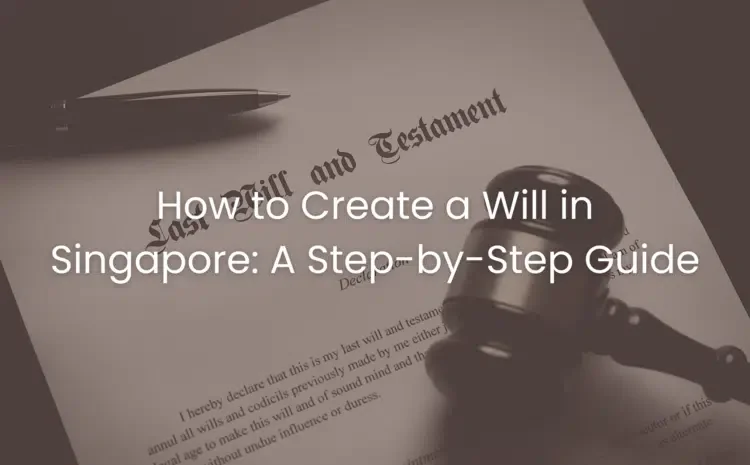How to Create a Will in Singapore: A Step-by-Step Guide
Creating a will in Singapore is a crucial step in ensuring that your assets are distributed according to your wishes after your passing. It offers peace of mind for you and security for your loved ones. Consulting an estate planning lawyer can help you navigate this process efficiently and avoid common pitfalls that may render a will invalid. In this step-by-step guide, we’ll explore how to draft a legally valid will in Singapore, important considerations, and why professional guidance is often essential.
1. Understand the Importance of Having a Will
Before diving into the process of creating a will, it’s essential to understand why having one is critical. A will allows you to:
Distribute assets according to your wishes, including property, savings, and personal belongings.
Appoint legal guardians for your minor children.
Minimize potential disputes among family members.
Expedite the probate process, reducing administrative burdens on your loved ones.
2. Determine Your Assets and Liabilities
The first step in drafting a will is to make a comprehensive list of your assets and liabilities. This includes:
Real estate (e.g., HDB flats, private properties)
Bank accounts and investments
Personal possessions, such as jewelry or vehicles
Liabilities like outstanding loans or debts
Creating a clear inventory ensures you know what you have to bequeath and helps prevent misunderstandings later on.
3. Decide on Your Beneficiaries
Next, decide who will inherit your assets. Beneficiaries can include:
Family members, such as your spouse, children, or parents
Charities or organizations you wish to support
Friends or others you care about
Clearly stating your beneficiaries and specifying what each will receive is essential to avoid disputes or ambiguity in your will.
4. Appoint an Executor for Your Will
An executor is the person responsible for carrying out your wishes as outlined in your will. Choose someone you trust to handle your affairs diligently. It is common to appoint a close family member, friend, or even a professional like an estate planning lawyer.
Key Responsibilities of an Executor Include:
Gathering and valuing your assets
Settling any outstanding debts
Distributing assets to beneficiaries according to the will
5. Consider Guardianship for Minor Children
If you have children under the age of 21, appointing a legal guardian in your will is vital. This ensures your children will be cared for by someone you trust should both parents pass away.
6. Consult with an Estate Planning Lawyer
While it is possible to draft a will on your own, consulting an estate planning lawyer in Singapore is highly recommended. A lawyer can help:
Ensure your will is legally valid and complies with Singapore’s requirements.
Provide advice on inheritance laws and tax considerations (if any).
Help with complex matters, such as setting up trusts for your beneficiaries.
An experienced estate planning lawyer will also help you avoid common mistakes that can lead to disputes or invalidate your will.
7. Draft Your Will in Writing
In Singapore, a will must be in writing to be legally valid. Clearly outline your wishes regarding the distribution of your assets, the appointment of an executor, and any other instructions. Be specific to minimize any potential confusion or misinterpretation.
8. Sign and Witness the Will
For a will to be valid in Singapore, it must be signed by you (the testator) in the presence of two witnesses. The witnesses must:
Be at least 21 years old.
Not be beneficiaries of the will or spouses of beneficiaries.
The witnesses must also sign the will in your presence. This formality ensures that the will cannot be easily challenged.
9. Store Your Will Safely
Once your will is finalized, store it in a safe location and inform your executor of its whereabouts. Consider placing it in a bank’s safety deposit box or with your lawyer.
10. Review and Update Your Will Regularly
Life circumstances change, and your will should reflect these changes. Review and update your will periodically or whenever there are significant life events, such as:
Marriage, divorce, or remarriage
Birth or adoption of a child
Major changes in your assets
Ensure Your Legacy is Protected
Creating a legally valid will in Singapore is one of the most important steps in ensuring your loved ones are cared for according to your wishes. By working with an experienced estate planning lawyer, you can avoid common mistakes, reduce family conflicts, and simplify the probate process for your beneficiaries.
At YY Lee & Associates LLC, our team specializes in estate planning and can guide you through every step of creating a will that reflects your wishes accurately. Contact us at 8780-2499 to schedule a consultation and secure your legacy with confidence.

